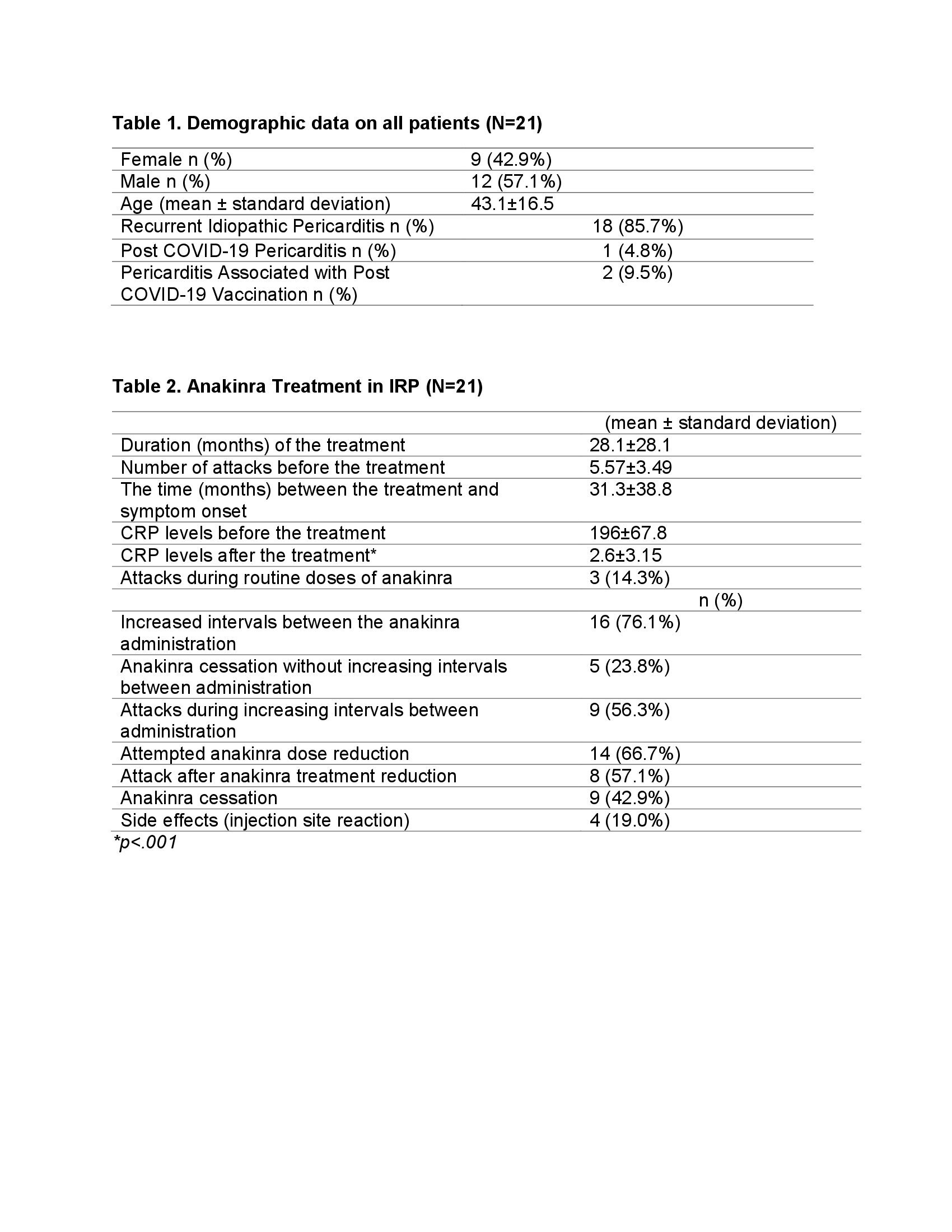Session Information
Date: Tuesday, November 14, 2023
Title: (1913–1944) Miscellaneous Rheumatic & Inflammatory Diseases Poster III
Session Type: Poster Session C
Session Time: 9:00AM-11:00AM
Background/Purpose: Idiopathic recurrent pericarditis (IRP) is defined by recurring episodes of pericardial inflammation without a known cause. This study investigates the safety and efficacy of anakinra, an interleukin-1 inhibitor, as an effective therapy for IRP in cases resistant to conventional therapy.
Methods: A retrospective evaluation of patients treated at our autoinflammatory center between 2011-2023 was conducted. Patient files were examined for demographic, clinical, and treatment response data, including non-steroid anti-inflammatory drugs (NSAIDs), corticosteroids, and colchicine. Monogenic autoinflammatory disease screening was performed for MEFV, TRAPS, MVK, NLRP3, and NOD2. The study evaluated anakinra treatment in IRP patients unresponsive to conventional therapy. Patients who experienced multiple episodes of pericarditis were diagnosed with recurrent pericarditis.
Results: The study included 21 participants, with 9 (42.9%) female and 12 (57.1%) male patients. The average age of the participants was 43.1±16.5 years. Among the participants, 2 (9.5%) were diagnosed with pericarditis following the COVID-19 vaccine, 1 (4.8%) experienced pericarditis after a COVID-19 infection, and 18 (85.7%) had a diagnosis of IRP. The MEFV mutation analysis revealed that 2 (9.5%) had a mutation in Exon 10, and 4 (19.0%) had a mutation in Exon 2. MEFV mutation carriers did not exhibit typical symptoms of Familial Mediterranean Fever (FMF). Among the participants, 9 (56.3%) were classified as steroid-dependent, 5 (31.3%) were not treated with steroids, and 2 (12.5%) showed no response to steroid therapy. Successful steroid tapering was achieved in 12 (75%) out of 16 patients, and 2 (16.7%) experienced attacks after tapering. Out of 3 patients, 2 (66.6%) successfully discontinued hydroxychloroquine (HQ), while out of the 15 cases, 14 (93.3%) successfully discontinued NSAID treatment. Colchicine treatment was discontinued in 6 (28.6%) out of 21 patients. The participants experienced an average of 5.57±3.49 attacks of pericarditis before starting anakinra. The duration between symptom onset and anakinra treatment initiation was found to be an average of 31.3±38.8 months. The average duration of anakinra treatment was 28.1±28.1 months. In 16 patients (76.1%), the interval between the anakinra administration was increased, among which 9 (56.3%) experienced attacks during this period. An attempt to discontinue anakinra treatment was made in 14 (66.7%) cases, resulting in 8 (57.1%) participants experiencing attacks when anakinra was stopped, and complete discontinuation was achieved in 9 (42.9%) participants. The levels of C-reactive protein (CRP) before anakinra treatment were measured to be an average of 196±67.8, while after anakinra treatment, the average levels were 2.6±3.15. Four patients (19.0%) experienced injection site reactions.
Conclusion: In conclusion, the study adds to the growing body of evidence of the use of interleukin-1 inhibitors, such as anakinra, as a promising treatment modality for RIP in cases resistant to conventional therapy.
To cite this abstract in AMA style:
Toker Dincer Z, Karup S, Yilmaz E, Corbali O, Ugurlu S. Anakinra Treatment in Idiopathic Recurrent Pericarditis: A Single-center Experience [abstract]. Arthritis Rheumatol. 2023; 75 (suppl 9). https://acrabstracts.org/abstract/anakinra-treatment-in-idiopathic-recurrent-pericarditis-a-single-center-experience/. Accessed .« Back to ACR Convergence 2023
ACR Meeting Abstracts - https://acrabstracts.org/abstract/anakinra-treatment-in-idiopathic-recurrent-pericarditis-a-single-center-experience/

